Lecture "Narratives about Women and Girls in Campaigns for Ethical Trade" by Prof. Lena Partzsch at Humboldt-University Berlin
As part of a panel on extractivism, Prof. Lena Partzsch gave a presentation at the international conference "Nature-Society Relations and the Global Environmental Crisis – Thinking on Climate Change and Sustainability from the Fields of Intersectional Theory and Transdisciplinary Gender Studies" at Humboldt-Universität zu Berlin, May 4-6, 2023.
News from May 04, 2023
Narratives about women and girls sometimes have a crucial relevance in the political communication of violent and commodity conflicts. The United States in 2010 and the European Union in 2017 adopted binding due diligence requirements for the initial import of so-called "conflict" minerals, namely tin, tantalum, tungsten, and their ores and gold, particularly from the Democratic Republic of Congo (DRC). This was led by campaigns by NGOs for whom the narrative of sexual violence against women in the violent conflict there was central. In this context, for example, Margot Wallström, as UN Special Envoy, referred to eastern Congo as the "rape capital of the world." Such narratives are seen as highly simplified, but are considered necessary for political communication. Critics:inside complain that they not only reproduce stereoptypes of women as victims, but also, by understating complexity, lead to policies that exacerbate the human rights situation on the ground.
The paper begins with an overview of the debate. This is followed by a literature review on the background to binding due diligence requirements for trade in commodities, focusing on "conflict" minerals from the DRC. It explains why simplified narratives are considered necessary in NGO communication. The focus is on narratives on gender, women and girls. The second part of the paper is dedicated to an empirical review of the narratives discussed in the literature. Currently, 130 German NGOs are campaigning for an EU supply chain law. In this context, mineral extraction in the DRC is repeatedly argued. Based on a systematic analysis of NGO publications and semi-structured interviews with their representatives, the current political communication is also evaluated in terms of measures to be taken: Which narratives shape the campaigns? What political measures follow from them?
Further information and the program of the conference can be found online.
